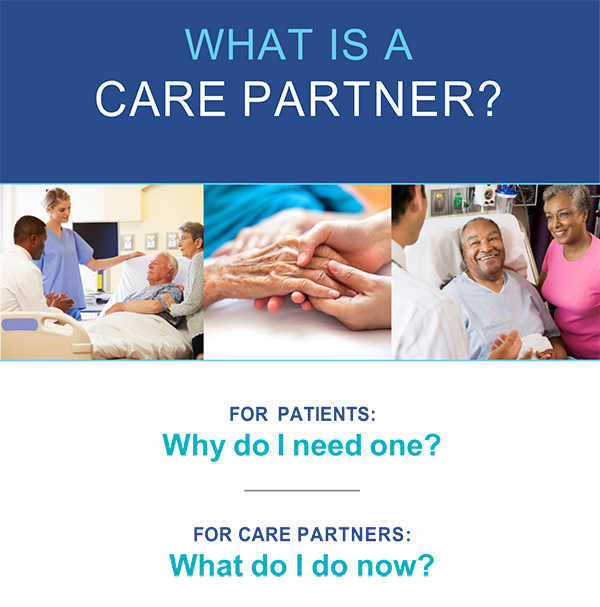Care Partner Program
For the Patient
Why do I need a care partner?
Taking care of yourself alone can be difficult, especially when you are sick and in the hospital. Having someone who knows you well and is willing to be another set of eyes and ears, can help you get the care you want and need in the hospital and have a smooth transition to successful recovery at home.
What is a care partner?
A care partner is someone you choose to help you during and AFTER your hospital stay. Your care partner also will help the healthcare team better understand your needs and preferences and may participate in your medical care. Your care partner should be prepared to be involved in your care for the entire hospital stay and help with your needs at home.
Your partner will be informed of your health progress. It will be necessary for them to be present if possible, or to have a working phone number so that the healthcare team can communicate with you care partner when needed.
Both the person you select and the hospital staff should know that they are your care partner. Once the hospital staff know who you have selected, they will ensure that your care partner is aware of any changes in the treatment plan and include your care partner in conversations with you regarding your care.
Having a care partner does not mean that you no longer get to choose what you want! The care partner helps support you and your choices and expresses them to the medical team. For example, when you are too tired or sick to do it yourself.
Who can be a care partner?
Care partners can be family members, friends, neighbors or paid assistants. Whoever you choose, you should be comfortable discussing your healthcare with that person and working with him or her to ensure you receive the care that you want.
The care partner should be available to support you both during and after the hospital stay.
For the Care Partner
What can I do as a care partner?
During the hospital stay
You can help staff understand the patient's care preferences and goals. This information is critical to helping staff understand what is important to the patient in their everyday life. To do this, you may want to participate in shift reports with the nursing staff or be present during daily patient care activities to share their care preferences and goals, shape the plan of care and inform the team of any issues they should take into consideration.
During their hospital stay, please feel free to:
• take notes and ask questions
• let the team know of anything that is concerning or confusing to
you or the patient
If you are not able to be here and would like updates,the best times to contact the nurse is between 8:30 am and 9:30 am or 2:00 pm to 4:00pm. This helps to decrease interruptions in the quality care your loved one is receiving.
Please remember that you are the one contact person that will coordinate communication between the health care team and those that the patient wants to be updated.
During the hospital stay and after
As the care partner, you can help the patient with understanding instructions that were provided regarding their care, help look for specific signs and symptoms related to the patient's diagnosis that should be reported to the health care team, help the patient in preparing for discharge and, most importantly, help the patient in preparing for a smooth transition to care at home. The health care team will tell you what to look for and who to talk to if you have concerns, including after the patient goes home.
After discharge
The health care team may ask you to assist with certain care or coordination tasks for the patient. If any help is needed, the health care team will teach you and the Patient how to do the task and ensure that you're both fully comfortable with everything before leaving the hospital.
Depending on the patient's needs, tasks may include:
• making and getting to appointments for follow-up care;
• remembering how and when to take medication;
• performing simple wound care and dressing changes;
• understanding dietary considerations to stay well post discharge;
• knowing who to contact if problems arise
• being available if medical equipment (ie: hospital bed or bedside
commode, etc.) is delivered to the home.
If you have any questions about the patient's care of being a care partner,
please contact:
The Care Call Line at 252-499-6091


